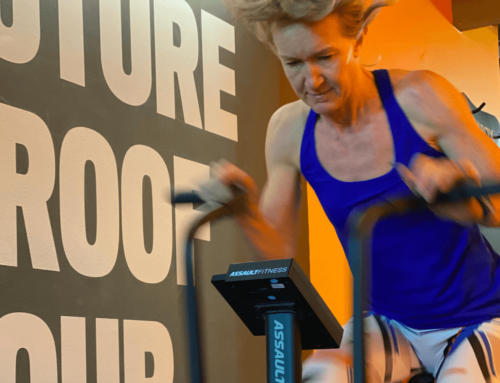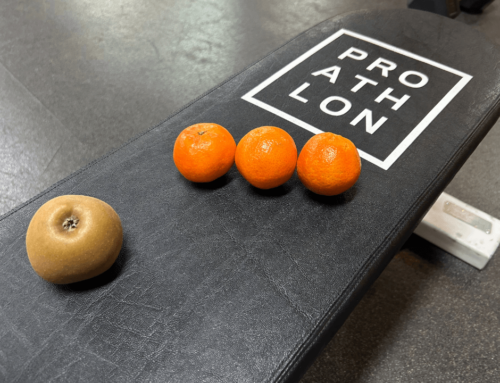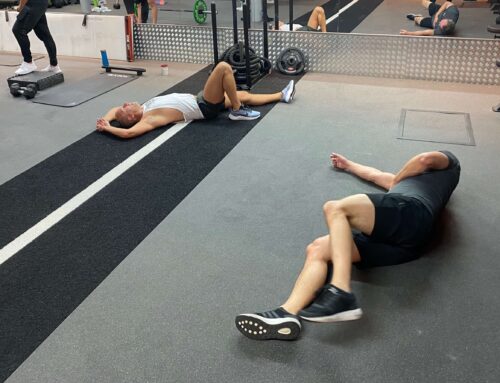If you want to improve your whole day, the missing link might be getting your morning routine right.
The blaring alarm shocks you out of a deep sleep, you snooze a couple of times with a feeling of dread, finally manage to drag yourself out of bed in a whirl of anxiety. You rush to the bathroom, checking WhatsApp and Social Media en route, and frantically get dressed for work.
You may or may not shovel down a quick breakfast of sorts, but all you really care about is when the first hit of caffeine is coming. Sound familiar?
It’s safe to assume that your state of mind from the first hour of waking is going to reflect through to your productivity and well-being for the rest of the day. The effects can even have implications for your training results. This is where a morning routine comes into play.
The #1 Step To Establishing A Morning Routine To Enhance Performance and Body Composition
The chances of implementing a sustainable morning routine are pretty remote without the number one ingredient – sleep. If your sleep is suffering, you are on the back foot from the get-go.
The benefits of sleep are numerous (some of which are still not fully understood), and include physical restoration, and improved learning and memory. Some of the effects of sleep deprivation for your training goals include
- A significant reduction in the ratio of muscle loss versus fat loss when dieting (1)
- An increase in appetite (2)
- A decrease in metabolic rate (3)
It’s certainly possible to take steps towards a morning routine with haphazard sleep, but taking steps to dial this in will greatly enhance your chances of success, benefitting your training performance, body composition, and health to boot.
Why Is A Morning Routine Beneficial?
It’s well known that some of the most successful people in business habitually integrate a morning routine to their lives. It becomes a way to consistently spend time on becoming a better version of yourself, the same way that training does.
A morning routine is said to boost happiness, increase productivity, reduce stress levels and get you grounded and settled for the day. It’s about getting started on the ‘right foot’. The feeling of being on top of things results in a positive effect on your entire day.
But why the morning? There’s a reason that Mark Twain said:
“Eat a live frog first thing in the morning, and nothing worse will happen to you the rest of the day.”
Willpower is a finite resource that is depleted through the day, as our self-control experiences fatigue (4). So it follows that making the morning count by setting up the day to do the more difficult things first, the things that you are unlikely to make time for later, is likely a good idea.
Another often-overlooked factor that benefits from a morning routine is chronic stress (as opposed to acute stress, like training, which you can recover from into a stronger, fitter version of yourself).
Stress is bad for everything. In fact, when you live a very stressful life, you die sooner (5). If that’s not enough to convince you, maybe the effects on your training might. Psychological stress reduces strength gains (6), increases the risk of injury (7) and can decrease energy expenditure by several hundred calories per day (see this article for more information around energy expenditure) (8).
7 Steps To Establishing A Morning Routine
There isn’t a morning routine that fits everyone, but these 7 steps are a great place to begin exploring:
- The first thing to do is set yourself a bedtime and wake up time. The time itself isn’t as important as consistency. Sleep quality is highly sensitive to timing disturbances (known as circadian rhythm) (8). In time you might find yourself waking up naturally refreshed before that terrible alarm goes up.
- Upon waking, make it a priority to hydrate yourself. Chug down a large glass of water. Water is the only nutrient you can’t do without for even a few days, and has a major effect on energy levels and brain function,
- Resist the temptation to check emails and social media. Once you open pandora’s box, you are in reactive mode, shifting focus to other people’s priorities rather than your own. This time is for you.
- You may like to exercise early in the morning, but if not, set up some kind of movement practice, even if for a few minutes. This could be some light cardio or walking, a movement flow, or stretching. Get the blood flowing through your body.
- Get some bright light exposure. This will improve sleep quality, productivity, and subjective wellbeing (9). In the summer months, this is easy enough by getting outside for your movement practice. In the winter you could consider investing in a daylight lamp.
- Implement a mindfulness practice. This could be meditation, journaling, or deep breathing (check out Wim Hof for ideas). Meditation effectively resets your mood state and stress level, and the reduction in anxiety and depression have good scientific backing (9). Investing in increasing your ‘presence’ greatly increases the enjoyment you get out of the daily experiences in life, reducing emotional reactivity.
- Create a routine around food and drink. If you do eat breakfast, this is a good time to get in a decent dose of protein, and a ton of micronutrients, before the doughnut temptations manifest at the office. My personal favourite is eggs, with a large medley of cooked spinach, tomatoes and mushrooms, or a greens smoothie if pushed for time. Greek yoghurt and fruit make for a tasty quick option. Enjoy your favourite beverage: coffee, herbal tea, or even consider a mushroom elixir.

Get Started
If your current morning routine is non-existent, don’t put pressure on yourself to implement all of the above and aim for perfection. Creating 5 minutes of extra time and implementing one or two of these suggestions is a great start. You can build from there. When time is scarce or you’re travelling, keep your morning routine intact but just condense each element.
Just like training, a morning routine is an investment in longevity and mental focus. Given the progressive improvements in both productivity and wellbeing over time, it’s well worth exploring. Are you ready to create yours?
References:
Wang, X., Sparks, J. R., Bowyer, K. P., & Youngstedt, S. D. (2018). Influence of sleep restriction on weight loss outcomes associated with caloric restriction. Sleep, 41(5)
Shechter, A., O’Keeffe, M., Roberts, A. L., Zammit, G. K., RoyChoudhury, A., & St-Onge, M. P. (2012). Alterations in sleep architecture in response to experimental sleep curtailment are associated with signs of positive energy balance. American Journal of Physiology – Regulatory Integrative and Comparative Physiology, 303(9), R883-9
Buxton, O. M., Cain, S. W., O’Connor, S. P., Porter, J. H., Duffy, J. F., Wang, W., … Shea, S. A. (2012). Adverse metabolic consequences in humans of prolonged sleep restriction combined with circadian disruption. Science Translational Medicine, 4(129)
Hagger, M. S., Wood, C., Stiff, C., & Chatzisarantis, N. L. D. (2010). Ego Depletion and the Strength Model of Self-Control: A Meta-Analysis. Psychological Bulletin, 136(4), 495–525
Prather, A. A., Epel, E. S., Arenander, J., Broestl, L., Garay, B. I., Wang, D., & Dubal, D. B. (2015). Longevity factor klotho and chronic psychological stress. Translational Psychiatry, 5(6), e585
Bartholomew, J. B., Stults-Kolehmainen, M. A., Elrod, C. C., & Todd, J. S. (2008). Strength gains after resistance training: The effect of stressful, negative life events. Journal of Strength and Conditioning Research, 22(4), 1215–1221
Mann, J. B., Bryant, K. R., Johnstone, B., Ivey, P. A., & Sayers, S. P. (2016). Effect of Physical and Academic Stress on Illness and Injury in Division 1 College Football Players. Journal of Strength and Conditioning Research, 30(1), 20–25
Giannotti, F., Cortesi, F., Sebastiani, T., & Ottaviano, S. (2002). Circadian preference, sleep and daytime behaviour in adolescence. Journal of Sleep Research, 11(3), 191–199
Giannotti, F., Cortesi, F., Sebastiani, T., & Ottaviano, S. (2002). Circadian preference, sleep and daytime behaviour in adolescence. Journal of Sleep Research, 11(3), 191–199
About the Author

After years of juggling a senior banking career with my passion for fitness, I left finance behind to focus on helping busy professionals transform their lives. As an online coach, I’m dedicated to building lean, healthy physiques through science-based training and nutrition.






